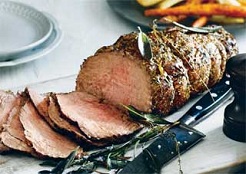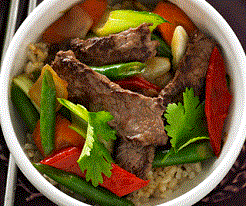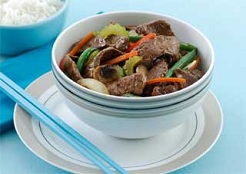Red meat is a rich source of essential nutrients and vitamins such as high-quality protein, iron, vitamin B12, niacin, thiamin, riboflavin, phosphorus and zinc. All of which help to provide us with energy and wellbeing. The Commonwealth Department of Health, the National Health and Medical Research Council (NHMRC) and the Dietitians Association of Australia (DAA) all advise, that eating red meat 3 to 4 times a week will ensure that you are receiving enough of these vitamins and nutrients, to help keep you healthy in mind and body.
Meat and Livestock Australia define red meat as meat from cattle, sheep and goats (beef, veal, lamb, mutton and goatmeat). It does not include meat from pigs (e.g. pork, ham, bacon) or kangaroo meat. The healthiest way to eat red meat is to buy lean cuts and trim down the fat content and buy lean mincemeat.
Protein:
Protein is an essential nutrient required by the human body to repair and maintain itself, specifically, brain cells, muscles, skin and hair. In order for the human body to breakdown protein, it must first be broken down into its smaller components called Amino Acids. This occurs in the stomach where protein-rich food such as red meat is broken down by gastric juices. The human body cannot store proteins, so it is important to top up regularly the best way to do this is to eat red meat 3 to 4 times per week.
Zinc:
The zinc content of red meat is essential for the human bodiess immune system in order for it to fight off foreign antibodies from attacking the bodies blood cells. It is also vitally important to all body tissues, especially the eyes, liver, brain, muscle and the reproductive organs of males.
Common signs of zinc deficiency include a poor sense of taste and smell, wounds that are slow to heal, acne, excessive hair loss, impotency, growth impairment and the appearance of white flecks on the fingernails.
Iron:
Iron is an important dietary mineral, the main role of which is in the red blood cells, which transport oxygen throughout the body. Here it combines with a protein to form a substance called haemoglobin, which then combines with the oxygen that we breathe to form oxyhaemoglobin. This is transported around the body by the blood cells, and oxygen is released wherever it is needed to allow the conversion of carbohydrates (sugars) into energy.
People who suffer from iron deficiency are likely to experience tiredness and feel very lethargic. Vegetarians and women are at high risk of becoming iron deficient especially when pregnant or breastfeeding. Eating red meat 3-4 times a week will ensure that you receive the recommended daily intake of iron as well as helping your body to absorb the nutrients contained in other foods.
Vitamin B12:
This vitamin is essential to the production and regeneration of red blood cells. It may be useful in the treatment of some types of anaemia, poor appetite and growth in children, excessive tiredness, sore mouth, feelings of numbness or stiffness and loss of mental energy. Vegetarians often lack this important vitamin by not eating red meat (www.naturalfacts.com.au).
The table below outlines the nutritional content of lean beef
Source: www.australianbeef.com.au





